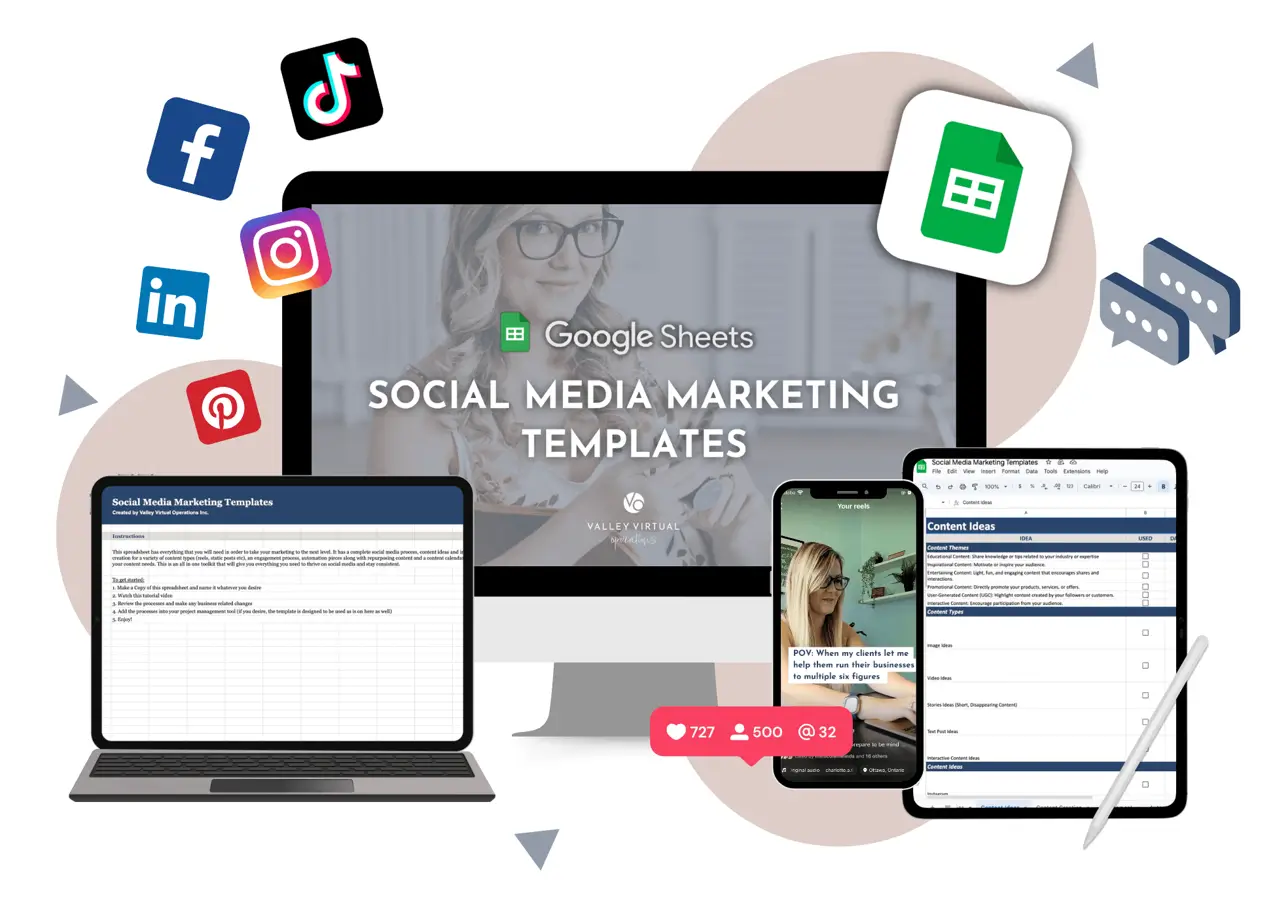Do you know how your business is doing? Is it meeting goals and growing upward, or is something preventing it from thriving?
When it comes to measuring the health of your business, there’s only one way to get an accurate reading- and that’s by tracking your data.
What are KPIs?
Key performance indicators (KPIs) are the specific goals you set within your business to verify that it’s growing in the right direction.
You want to set up specific KPIs for every member of your team, including yourself, so everyone knows the goals for their departments.
Then, set up some general KPIs to monitor the health and wellness of your business as a whole.
That’s where your KPI dashboard comes in.
KPI Dashboard
One of the easiest ways to set up your KPIs is through a dedicated KPI dashboard.
I like to use Google Sheets- that way, I can go in and track my progress, update the data as needed, and access it from wherever I need to. It also makes it easy for the entire team to update and share their pieces as well.
However, making a dashboard won’t help if you don’t know what you’re tracking.
What KPIs to Track For Your Business
Your KPIs can cover a range of goals and statistics, but there are three that every business should track to stay healthy, wealthy, and successful. They are:
- Profit and Loss
- Revenue
- Customer Retention
Profit and Loss
Every business needs to know where their money is coming from, where it’s going, and how much they have left over.
By tracking your Profit and Loss KPI, you can steer your business away from excessive spending and watch your financial goals get closer with every week. If you’re finding that you are losing money monthly then it’s time to take a step back and start making the business profitable again.
Revenue
Now that you’re tracking your expenses and income (aka Profit and Loss), you can start monitoring your revenue.
Revenue is the total amount of money you make from your sales, and tracking it can tell you which products or services are performing better than others.
You can see trends like which product is more popular than another one or which services are outperforming the rest of them. This way you’re not just guessing and you can put more effort into the products or services that are making you the most money.
Customer Retention
As the name suggests, the customer retention rate (CRR) is the amount of customers that stick with a business over time.
You find the CRR by using this formula:
Customer retention rate = ((End number of customers – New customers gained) / Starting number of customers) x 100
So, let’s say you have 2000 customers on January 1st, then 2200 on December 31st, and you gained 300 new customers throughout the year. By using the formula, we get:
((2200-300)/2000)x100= 95.
That’s a 95% retention rate, which is a number I could live with.
By tracking your CRR as a KPI, you can monitor your retention rate and confirm that your customers are happy with their experiences.
More KPIs to Track
Those are the big three that you should be aware of, but the opportunities for KPIs are endless depending on what you’d like to measure in your business.
Some other examples are:
Financial:
- Revenue
- Profit
- Loss
- Customer Lifetime Value
Marketing
- Return on Ad Spend (ROAS)
- Conversion Percentage
- Cost per Lead
- Cost per Acquisition
- Visibility
- Website Traffic
- Visits per Platform
Sales
- Sales Rate
- Average Order Value
Fulfillments:
- Return on Investment (ROI)
- Task Completion Rates
- On-Time Delivery (Projects)
- Missed Milestones (Projects)
Customer Service
- Net Promoter Score
- Customer Retention Rate (CRR)
- Customer Ratings
As you can see, KPIs can be anything (and everything) associated with your business. You can even use it to monitor your team.
What KPIs to Track For Your Team
Like your business, your team must meet deadlines and reach their goals. Otherwise, they risk becoming an issue for the growth of the business or how efficient they are performing- and no one wants that.
To help them stay on track, give them a set of KPIs to monitor. You can use a variety of options, such as:
- Hours Tracked
- Tasks Completed per Project
- Tasks Overdue per Project
- Backlinks Created
- Published Social Media Content
- Published Blog Posts
- Emails Sent
- Customer Churn Rate
- Issue Resolution rate
- Project Cycle Time
- Project Errors
- Resource Capacity Utilization
- Customer Satisfaction
- Estimated Costs vs. Actual Costs
- Estimated Time vs. Actual Time
By tracking 2-3 select KPIs, you can monitor your team and ensure they’re meeting deadlines, hitting goals, and doing their part to make your business run like a well-oiled machine.
Final Thoughts
Your KPIs are essential for tracking the health and wellness of your business. And, with so many KPI possibilities, you can keep track of every dollar, every keystroke, and every unhappy customer with ease.
Once you get into the habit of tracking your data, you’ll be able to meet your business goals and help your business thrive with every new update to your KPI dashboard.







